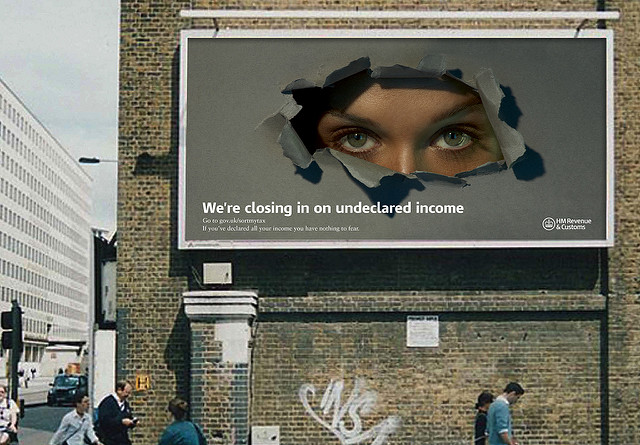Open Up or Shut Up? David Cameron’s three transparency problems
Politicians who guarantee greater transparency frequently find their promises coming back to haunt them. Ben Worthy writes that although the Prime Minister has done nothing against the law, his high profile bid to tackle tax evasion and castigation of tax dodgers in the past left him open to charges of hypocrisy when his own tax affairs came under the spotlight last week.

Credit: HM Revenue & Customs CC BY 2.0
Promises of transparency often come back to haunt politicians. There’s an ever present danger that anyone promising or championing openness will, at some point, be hoisted by their own petard. David Cameron is currently finding this out over his tax affairs.
In the US candidates and office holders regularly publish their tax returns as a matter of course, as well as their medical check-ups (except, it seems Donald Trump). You can see Hillary Clinton’s returns here and Bernie Sander’s (possibly not complete) ones here. Details of Obama’s falling income are on the White House website and you can see Reagan’s, Nixon’s, Truman’s and some of FDR’s on the great Tax History project site.
The tax and financial affairs of political leaders in the UK are a little less automatically public. This is fortunate for them, as many Prime Minister’s financial affairs have been rather questionable, less in law than in what it tells us about them, from the tangled finances of Lloyd George to Winston Churchill’s hand to mouth existence and vast spending (not to mention Tony Blair’s post-office money making).
However, the tax affairs of politicians became a bigger issue in the 2012 London Mayoral Campaign, when Labour candidate Ken Livingstone was attacked for his arrangements. It cropped up again in this year’s contest when Zac Goldmsith released his returns following allegations of his non-dom status. It’s also become a little more common for senior politicians to publish and be damned – you can see Labour Chancellor John McDonnell’s returns here.
Cameron’s particular difficulties are not legal, as he has done nothing against the law, but rather presentational. First, in 2012 Cameron very clearly promised to publish his returns and was ‘said to be relaxed and happy’ about it – conveniently just when Ken Livingstone was having difficulties (though perhaps too relaxed as by 2015 they still weren’t published with no plans to do so). The media were handed a very obvious promise to work with that led to him publishing his tax returns, now joined by SNP leader Nicola Sturgeon, Scottish Labour leader Kezia Dugdale and Scottish Conservative leader Ruth Davidson. Pressure is now building on the Cabinet to do the same and, possibly, all MPs.
Second, he has made a very high profile bid to tackle tax evasion through Beneficial Ownership, and spoken out repeatedly against tax havens, not once but three times in this speech at the OGP summit in 2013 , in his letter to all British Overseas Territories and Crown Dependencies in 2014 and his berating of tax havens again in 2015. He also criticised various people involved in various types of evasion, including comedian Jimmy Carr and Take That (though he let Gary Barlow keep his OBE). More generally, in 2010, he promised ‘a transparency revolution’ and to make ‘our government one of the most open and transparent in the world’. This, of course, opens him up to charges of hypocrisy and double standards.
Finally, Cameron came close to falling into what you could call the Lyndon Johnson trap of being made to publically deny something. He spent 4-5 days last week appearing to evade full answers to questions about his tax, perilously close to Alastair Campbell’s seven day survivability test. It’s possible a full answer on Sunday or Monday would have put it to rest, or at least made it look less worse.
So Cameron’s promises have come back to haunt him. YouGov shows his ratings have slipped to 2013 levels and he isn’t out of the woods yet – questions have been raised about his ‘gift’ from his mother and he has been reported to the Parliamentary Standards Commissioner (Ken Livingstone got his revenge by calling on him to resign and be sent to prison). He joins a long list of leaders from Woodrow Wilson to Tony Blair and Barack Obama who got trapped in their own transparency promises. He probably wishes he had been a little less open about being open.
__
Note: This post represents the views of the authors and not those of Democratic Audit UK or the LSE. Please read our comments policy before posting.
__
 Ben Worthy is Lecturer in Politics at Birkbeck College, University of London.
Ben Worthy is Lecturer in Politics at Birkbeck College, University of London.





 Democratic Audit's core funding is provided by the Joseph Rowntree Charitable Trust. Additional funding is provided by the London School of Economics.
Democratic Audit's core funding is provided by the Joseph Rowntree Charitable Trust. Additional funding is provided by the London School of Economics.
Open Up or Shut Up? David Cameron’s three transparency problems https://t.co/rqP0myI779
Open Up or Shut Up? David Cameron’s three transparency problems https://t.co/ZkOh6kHsbY
Open Up or Shut Up? David Cameron’s three transparency problems https://t.co/PW2WAEfU95
Open Up or Shut Up? David Cameron’s three transparency problems https://t.co/YcyJDE65I5
Open Up or Shut Up? David Cameron’s three transparency problems https://t.co/PWHxRrwYpV
Open Up or Shut Up? David Cameron’s three transparency problems https://t.co/8ZH1REJxAT #PMQs #panamapapers
Open Up or Shut Up? David Cameron’s three transparency problems https://t.co/W85FCUegqu https://t.co/vdCWBhfLFm